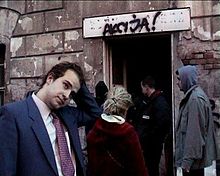
Squatting is the action of occupying an abandoned or unoccupied area of land or a building, usually residential, that the squatter does not own, rent or otherwise have lawful permission to use. The United Nations estimated in 2003 that there were one billion slum residents and squatters globally. Squatting occurs worldwide and tends to occur when people find empty buildings or land to occupy for housing. It has a long history, broken down by country below.

The Yugoslav Wars were a series of separate but related ethnic conflicts, wars of independence, and insurgencies that took place from 1991 to 2001 in what had been the Socialist Federal Republic of Yugoslavia. The conflicts both led up to and resulted from the breakup of Yugoslavia, which began in mid-1991, into six independent countries matching the six entities known as republics that had previously constituted Yugoslavia: Slovenia, Croatia, Bosnia and Herzegovina, Montenegro, Serbia, and Macedonia. SFR Yugoslavia's constituent republics declared independence due to unresolved tensions between ethnic minorities in the new countries, which fueled the wars. While most of the conflicts ended through peace accords that involved full international recognition of new states, they resulted in a massive number of deaths as well as severe economic damage to the region.

Slobodan Jovanović was a Serbian and Yugoslav writer, historian, lawyer, philosopher, literary critic, diplomat, politician and one of the most prominent intellectuals of his time. He was the professor at the University of Belgrade Faculty of Law (1897—1940), Rector of the University of Belgrade, and the President of the Serbian Royal Academy (1928–1931). He took part at the Paris Peace Conference (1919) as an expert for the Yugoslav Government.

The Sajmište concentration camp was a Nazi German concentration and extermination camp during World War II. It was located at the former Belgrade fairground site near the town of Zemun, in the Independent State of Croatia (NDH). The camp was organized and operated by SS Einsatzgruppen units stationed in occupied Serbia. It became operational in September 1941 and was officially opened on 28 October of that year. The Germans dubbed it the Jewish camp in Zemun. At the end of 1941 and the beginning of 1942, thousands of Jewish women, children and old men were brought to the camp, along with 500 Jewish men and 292 Romani women and children, most of whom were from Niš, Smederevo and Šabac. Women and children were placed in makeshift barracks and suffered during numerous influenza epidemics. Kept in squalid conditions, they were provided with inadequate amounts of food and many froze to death during the winter of 1941–42. Between March and May 1942, the Germans used a gas van sent from Berlin to kill thousands of Jewish inmates.
Jatagan Mala is a former urban neighborhood of Belgrade, the capital of Serbia. It existed from 1919 to 1961 and was located in the municipality of Savski Venac. Jatagan Mala became a point of media interest in 2017 with the broadcast of TV serial Shadows over Balkan, which was partially located in Jatagan Mala during the Interbellum.
Romani people, or Roma, are the fourth largest ethnic group in Serbia, numbering 131,936 (1.98%) according to the 2022 census. However, due to a legacy of poor birth registration and some other factors, this official number is likely underestimated. Estimates that correct for undercounting suggest that Serbia is one of countries with the most significant populations of Roma people in Europe at 250,000-500,000. Anywhere between 46,000 to 97,000 Roma are internally displaced from Kosovo after 1999.
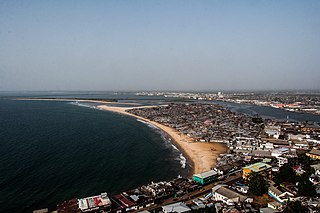
West Point is a township of the Liberian capital city of Monrovia, located on a 0.53 km2 peninsula which juts out into the Atlantic Ocean between the Mesurado and Saint Paul rivers. West Point is one of Monrovia's most densely populated slums.

Devedesete is the tenth studio album released by Serbian and former Yugoslav singer-songwriter Đorđe Balašević.

In England and Wales, squatting – taking possession of land or an empty house the squatter does not own – is a criminal or civil offence, depending on circumstances. People squat for a variety of reasons which include needing a home, protest, poverty, and recreation. Many squats are residential; some are also opened as social centres. Land may be occupied by New Age travellers or treesitters.

Squatting in the Republic of Ireland is the occupation of unused land or derelict buildings without the permission of the owner. In the 1960s, the Dublin Housing Action Committee highlighted the housing crisis by squatting buildings. From the 1990s onwards there have been occasional political squats in Cork and Dublin such as Grangegorman, the Barricade Inn, the Bolt Hostel, Connolly Barracks, That Social Centre and James Connolly House.
Novi Bioskop Zvezda is a squatted cinema in Belgrade, Serbia. Built in 1911, it is the oldest cinema in the city. After a period of dereliction, it was occupied in 2014 by the Movement for the Occupation of Cinemas. The squatters received international support and a documentary was released in 2018 about the occupation.
Squatting in Slovenia is the occupation of derelict buildings or unused land without the permission of the owner. Housing was illegally built from the 1960s onwards and informal settlements have been set up by Romani people or poor immigrants. In the capital Ljubljana, there is the autonomous zone of Metelkova and the Rog self-managed social centre was evicted in early 2021.

Squatting in Peru is the occupation of unused or derelict buildings or land without the permission of the owner. From the 1940s onwards, land invasions created shanty towns which were first called barriadas and later pueblos jóvenes. They were initially repressed, then the government decided upon toleration and by 1998 it was estimated 2.5 million inhabitants were living in this way in the capital Lima. There are also slum tenements in the centre known as solares or tugurios, and a "Wall of Shame" has been built to separate rich and poor areas of the city. During the COVID-19 pandemic, an increase in the occupation of UNESCO World Heritage Sites such as Caral and the Nazca Lines was reported.

Squatting in Sudan is defined as the "acquisition and construction of land, within the city boundaries for the purpose of housing in contradiction to Urban Planning and Land laws and building regulations." These informal settlements arose in Khartoum from the 1920s onwards, swelling in the 1960s. By the 1980s, the government was clearing settlements in Khartoum and regularizing them elsewhere. It was estimated that in 2015 that were 200,000 squatters in Khartoum, 180,000 in Nyala, 60,000 in Kassala, 70,000 in Port Sudan and 170,000 in Wad Madani.

Urban areas in the Philippines such as Metro Manila, Metro Cebu, and Metro Davao have large informal settlements. The Philippine Statistics Authority defines a squatter, or alternatively "informal dwellers", as "One who settles on the land of another without title or right or without the owner's consent whether in urban or rural areas". Squatting is criminalized by the Urban Development and Housing Act of 1992, also known as the Lina Law. There have been various attempts to regularize squatter settlements, such as the Zonal Improvement Program and the Community Mortgage Program. In 2018, the Philippine Statistics Authority estimated that out of the country's population of about 106 million, 4.5 million were homeless.

Squatting in Bangladesh occurs when squatters make informal settlements known as "bastees" on the periphery of cities such as Chittagong, Dhaka and Khulna. As of 2013, almost 35 per cent of Bangladesh's urban population lived in informal settlements.
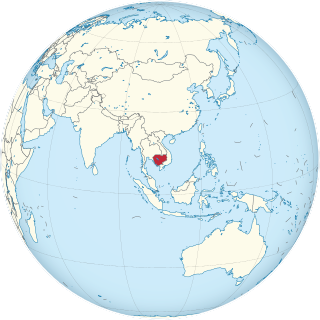
Squatting is common in the country of Cambodia. Following the Khmer Rouge and the Pol Pot regime, the new democratic government introduced land reform. In the capital Phnom Penh, where in 2003 an estimated 25 per cent of the population was squatting, there are informal settlements and occupied buildings.
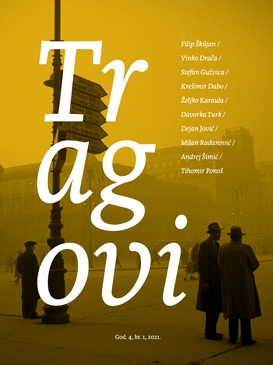
Tragovi: Journal for Serbian and Croatian Topics is a biannual peer-reviewed open access academic journal published by the Serb National Council and the Archive of Serbs in Croatia. The journal publishes papers from various fields of social sciences and humanities focused on Serbian, Croatian, and Yugoslav studies. The goal of initiators was to create a fundus of 350 scientific articles over the period of 20 years which will constitute an unavoidable reference point for the field of studies the journal covers.

Squatting in Croatia has existed as a phenomenon since the decline of the Roman Empire. In the 1960s much private housing in major cities was illegally constructed or expanded and since the 1990s squatting is used as a tactic by feminists, punks and anarchists. Well-known self-managed social centres such as the cultural centre Karlo Rojc in Pula, Nigdjezemska in Zadar and (AKC) Medika in Zagreb.
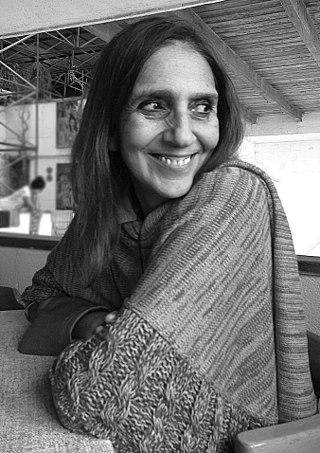
Evelia Peralta is an Argentine-born Ecuadorian architect. She has published several books on contemporary architecture and the architecture of Quito. She directs an architectural magazine titled Trama and she co-founded the Bienal Panamericana de Arquitectura de Quito.

